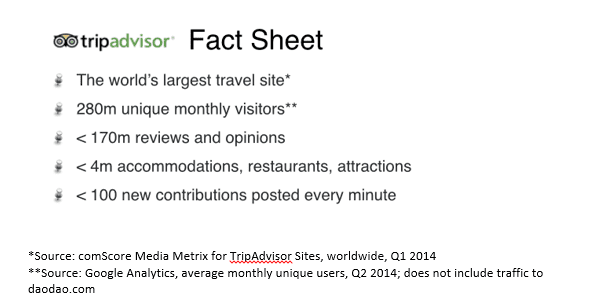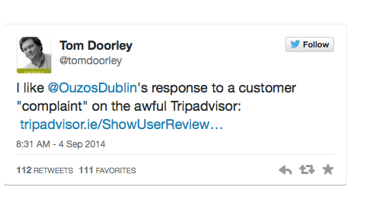Tips to improve social proof on TripAdvisor including how to handle negative reviews and 6 best practice tips
One of our clients is a group of eight hotels, so for them, like all hospitality businesses, TripAdvisor can be both friend and foe. Recently I was asked to look at each hotel’s presence on TripAdvisor and to suggest some tips for best practice. I was surprised by the lack of online commentary so here are my thoughts.
Setting the scene for TripAdvisor - how it dominates the travel industry.

How to handle negative reviews on Tripadvisor?
Clients we speak to are often worried about entering the world of social media, afraid it will open the door to negative reviews. Our response is consistent; a presence on social media doesn’t create negative reviews, nor does an absence prevent them. What it does do is allow your brand the opportunity to be part of the conversation and to respond appropriately. But what is an appropriate response?
Example of a restaurant's response to an online customer review
Recently the Irish Examiner published an article titled ‘Read a Dublin restaurant owner’s perfect response to an awkward customer.’
The article details the incident as they see it:
‘Laura Sweeney visited the restaurant one afternoon and found fault with everything. She complained that her party had to sit indoors on a sunny day, despite the fact that they were offered a table outside. 'We were comfortable outside but moved inside anyway,; she wrote.
The food was Laura's main complaint. ;My dish of Scampi was lukewarm as I discovered when I cut into and ate half of one,' she wrote. She says she asked for a fresh dish but 'a young waitress came back with my original Scampi which was much browner and the half one included.
'The manager insisted it was fresh and when I pointed out the half she said the chef had cut it to see if it was hot.'
An obviously annoyed Laura decided to leave. 'Not fancying my chances with reheated fish I passed the dish.'
The article then details the restaurant’s owner’s response, titled 'How not to behave when out', a reference to the customer’s tag line, 'How not to run a restaurant'.
The response continues with a line-by-line rebuttal of the customer’s review, interjected with some fairly personal attacks including:
- 'The staff of course knew the type of person we were dealing with.'
- 'It would seem that the type of person who takes to the internet to complain is a particular difficult individual to keep happy.'
- 'You then threaten her with TripAdvisor! (A nasty tactic you have used in a restaurant before, and that’s according to a poor restaurateur who had the misfortune to have you as a guest).'
- 'I find it shocking to think there are people like you out there who have been empowered by the likes of Trip Advisor and feel they have the right to publicly criticise a girl doing her job and set out to cause deliberate harm to an individual and a business.'
- 'The fact is, you would be much better off putting a smile on your face and treating people with respect, you will find life and eating out will be much more enjoyable.'
The article claims the owner’s rebuttal drew much praise, indeed Tom Doorley, a well known Irish food critic tweeted 'I like @OuzosDublin’s response to a customer 'complaint' on the awful Tripadvisor.'

Whilst it may have made the owner feel better for the time he was composing his response, does it leave a good taste in the mouth for future diners? When responding to negative reviews, however unjustified you may feel they are, my view is that less is more.
Whether the customer was right or wrong in this case, a response / attack like this one does not shine favourably on Ouzos. I wonder if on reflection, this owner would agree, as the response has since been removed.
Should we ignore bad online customer reviews?
Only 1 in 4 reviews on TripAdvisor are responded to, suggesting many believe ignoring reviews is the best strategy. Not so according to TripAdvisor research.*
78% of respondents agreed that seeing a management response to a review ‘makes me believe the hotel cares more about its guests’ (versus a comparable hotel that didn’t respond) and 57% agreed that seeing hotel management responses to reviews ‘makes me more likely to book.’
Research conducted by TripAdvisor encouraging more interaction and prominence for TripAdvisor should possibly be taken with a pinch of salt, but as a TripAdvisor user, I agree with the majority. When researching hotels and restaurants, a negative review with an appropriate response can help rather than hinder the decision making process.
*http://www.tripadvisor.co.uk/TripAdvisorInsights/n1974/management-responses-best-practices-less-5-minutes
Recommendations for best practice on TripAdvisor
- 1. Respond to every review whether positive or negative
If someone has taken the time to review your establishment, it is polite to acknowledge that whether it is positive or negative. In my research, many establishments only responded to negative reviews.
- 2. Respond promptly, no more than 2 weeks later
Unless a friend or friend of a friend has left a review, TripAdvisor shows the most recent review first, that review is shaping your potential customers first impression.
- 3. Don’t get into tit for tat
Tone is extremely hard to convey in writing and, arguing against or questioning a customer’s experience usually doesn’t come across well. Either acknowledge the criticism and move on, or offer to have a further conversation offline. This conveys to potential customers that you take criticism seriously but doesn’t allow for a war of words.
- 4, Using different staff members to respond shows personality and team work
For one of our client’s hotels, the General Manager always responds to negative reviews, but for their many positive reviews, a variety of staff members respond. Who, depends on what the reviewer has highlighted. Often this means it is the Head Chef, the Front of House Manager or the Restaurant Manager, however the Head Groundsman also had the limelight in this review, excerpted below.
Review
' I even came away with a few good tips on how to remove moss from driveways, from the very interesting hotel handyman ' James '! Who also gave me a potted history of the town and some tips on where to try my luck fishing, I'm hoping his tips re moss removal prove to be more successful than his fishing tips were! If you go, do look out for James, as he is an absolute mine of local information, which I always find makes the stay so much more interesting.'
The Response
'Thank you for leaving such a great review for us. It was very kind of you to mention me in your feedback and I was glad to be of assistance with your moss issue. I'm sorry that my fishing tips didn't work out (a fisherman will of course never reveal his best tips!)
I do hope to see you when you come back for another visit.
Regards to you and your good lady wife.
James, Hotel and Grounds Guardian'
TripAdvisor responses can appear repetitive which is another advantage of allowing multiple staff members to respond
- 5. Word of mouth is important to TripAdvisor
Reviews on TripAdvisor default to listing friends’ (and friends of friends) reviews at the top, no matter how old.
- 6. Be proud of your positive feedback
Make sure you take time to shout about it through social media and other channels
If you have any TripAdvisor experiences or tips you’d like to share, we’d love to hear them.
 Thanks to Kathryn Hellewell for sharing her advice and opinions in this post. Kathryn is a digital strategist and social media trainer at Taleist, helping organisations conquer their digital, social and content challenges. You can connect with her on LinkedIn or via Twitter @Katche7.
Thanks to Kathryn Hellewell for sharing her advice and opinions in this post. Kathryn is a digital strategist and social media trainer at Taleist, helping organisations conquer their digital, social and content challenges. You can connect with her on LinkedIn or via Twitter @Katche7.




 Thanks to Kathryn Hellewell for sharing her advice and opinions in this post. Kathryn is a digital strategist and social media trainer at
Thanks to Kathryn Hellewell for sharing her advice and opinions in this post. Kathryn is a digital strategist and social media trainer at 

